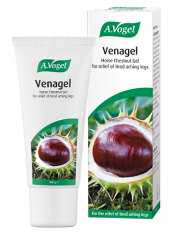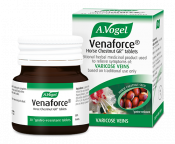What causes severe leg cramps at night?
Leg cramps at night can be unpredictable, painful and can severely disrupt your sleep. There are a variety of factors that can contribute to the problem, including:
- Varicose veins
- Physical exercise
- Dehydration
- Lack of magnesium.
Read on to find out a bit more about why these factors can contribute to leg cramps at night, and get some tips to help manage the problem.
1. Varicose veins
Varicose veins are veins that have expanded so that the valves within are unable to close properly. This sends blood flow backwards, as well as forwards, causing blood to pool in the veins. In the process, this can also cause the veins to become twisted and coarse.
As you can imagine, this is likely to cause pain, cramps and achy legs.
Lying in bed will exacerbate stagnated blood flow in varicose veins so night time can be worse for people whose veins are in poor shape.
How to prevent leg cramps at night
- Apply Venagel Horse Chestnut gel to the legs before going to bed.
- Longer term, treat varicose veins with Horse Chestnut. This should start to improve symptoms of varicose veins within two weeks.
- Prop your feet up on a pillow to help prevent blood pooling in the legs during the night.
My Top Tip:

Massage Venagel onto the legs with upward strokes to help relieve tired, achy legs.
"This gel certainly does help to revitalise tired, achy legs that are due to varicose veins."

2. Physical exercise
Physical activity can also lead to muscle cramps. Putting too much pressure on the muscles during exercise, for example, can lead to injury and cramp. In this instance, cramps are intended to help stabilise the area and minimise movement.
This is particularly common if you are new to an activity, or if you suddenly increase the intensity of your workout.
On the other hand, if you are used to exercising but then take a sudden break, it could lead to your exercise-accustomed muscles cramping up in protest at the inactivity.
Both of these problems are likely to become more noticeable at night when you are lying still.
How to prevent leg cramps at night
- Stretching before and after physical exercise will reduce the likelihood of cramping muscles.
- If you exercise regularly and then have to stop for some reason, maintain daily stretches to prevent muscle cramp.
3. Dehydration
Muscles need sufficient water (and nutrients) in order to contract properly. If the body is deficient in either of these things, it can lead to painful muscle cramps.
The more dehydrated you are, the more likely it is that cramps will develop.
How to prevent leg cramps at night
- Drink at least 1.5 litres of still, plain water daily. If you need help with this, check out some of our tips on how to drink more water.
- Keep caffeinated drinks to a minimum. These can actually contribute to dehydration.
- If you are keen on fizzy drinks, this may be another key reason for the cramps so start to cut down.
- Drink plenty of water when exercising to avoid a painful combination of dehydration and exercise-induced cramping.

4. Magnesium deficiency
One of magnesium's many roles within the body is to help keep the muscles relaxed. Therefore, if you aren't getting enough of this important nutrient, it can lead to muscle cramp.
Cramps caused by magnesium deficiency may be exacerbated by stress, as the nervous system uses up a great deal of magnesium.
Magnesium is very important for the proper functioning of the adrenal glands, which produce adrenalin when you're stressed. As magnesium is also needed for other things, such as keeping your muscles relaxed and free from knots, you'll notice when the adrenals are soaking it all up and leaving less for your muscles.
How to prevent leg cramps at night
- Increase your intake of magnesium-rich foods, such as brazil nuts, cashews, sesame seeds, soya, haricot and kidney beans, chickpeas, millet, oats, brown rice, figs, spinach, dark green vegetables, dried apricots, buckwheat and bananas.
- Avoid magnesium-draining caffeine.
- Take Salus Haus liquid magnesium and A.Vogel Urticalcin to assist better magnesium/calcium balance.
- Diuretic medication may reduce magnesium levels so discuss the cramps with your doctor if you are taking diuretics.
Other common reasons for leg cramps at night
The four issues listed above are perhaps the most common reasons for leg cramps at night. They are, however, by no means the only things that can contribute to the problem. Some additional reasons for severe leg cramps at night include:
Fatigue – the muscles function less effectively when you're tired which may lead to cramp.
Sleeping position – staying in the same position for long periods at a time can restrict blood flow through the legs and lead to cramp.
Low calcium – this can contribute to muscle cramps.
A sedentary lifestyle – the muscles need to stretch regularly in order to work properly. Therefore, staying still for long periods can hamper blood flow and increases the chance of developing varicose veins.
Low potassium – this can cause muscle cramps and muscle weakness.
Posture – sitting with your legs crossed can prevent blood flowing through the body properly.
If you're interested, check out our blog 'How to prevent muscle cramps' for more tips and advice on how to manage the problem.
Originally published on 20 July 2012 (updated on 18 November 2019)








